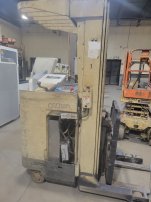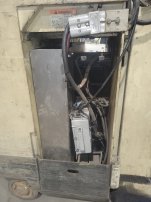Bill D
Diamond
- Joined
- Apr 1, 2004
- Location
- Modesto, CA USA
The Edxison batteris use a simple charger and last forever. They have have low energy density so weigh a lot more then lead acid.
Bill D
Bill D
Follow along with the video below to see how to install our site as a web app on your home screen.
Note: This feature may not be available in some browsers.
And still nobody here has tried to power an electric forklift with a welder yet. I'm waiting.

well not really efficent, a car EV battery runs about 272VDC, so won't work with a 48V system without some major electronics. As DC won't work with any sort of transformer to step it down, only means a really expensive inverter that can handle that high of voltage and not just kill anyone that charges the battery. thats why the motors are all 3 phase, i believe it runs off 244V
I work in a factory that builds them in qc.Most current street-legal EVs have either 400 or 800 volt batteries. EV battery in this context is not to directly power the forklift, but to serve as a donor of cheap battery cells. One doesn't even need to buy the whole battery and take it apart - there are many online vendors, including on Ebay, selling individual modules from a variety of EVs. No major electronics is required. Also you can't step-down DC with a transformer, need a DC-DC (buck) converter instead.
I work in a factory that builds them in qc.
They are no where near 400v
They are in the 240v to 280V range.
Ask me how i know.
Ev toyotas run on 247V
Hybrids are 272V
Some of them had voltage doublers in the battery pack and they ran 500+v to the motors.I work in a factory that builds them in qc.
They are no where near 400v
They are in the 240v to 280V range.
Ask me how i know.
Ev toyotas run on 247V
Hybrids are 272V
The guy who had Tesla batteries in his 48 v order picker broke the batteries apart into 24 v sections. As I recall, he said they were older model S donor batteries.


Lots of good stuff in this thread ..
especially the EV cars voltages for various brands.
In reality, any battery of sufficient capacity will power any motive source, like a forklift, or a car, and any voltage needs are easily done by a dc-dc converter.
Yeah, when your current is under 30A or so. Take a look at DC-DC converters rated for 400A, you are in for a surprise.
Yeah, right.
The tsla 7-in-1 power module is under 20 kg in mass, under 500$ in costs, does 1700 amps at 400V, and delivers cabin heating as a controllable byproduct.
And battery heating.
There are breakdowns, from sandy munro and others, and component costs are well known.
The tesla module is cheap because it is very efficient - thus not losing lots of power in heat -- thus not requiring lots of cooling and heat sinks and extra power components.
It re-circulates current losses very well.
By about 2020 tsla had built at least 13 versions, shipping, using 203 igbts. before their own power modules, currently shipping.
Notice
This website or its third-party tools process personal data (e.g. browsing data or IP addresses) and use cookies or other identifiers, which are necessary for its functioning and required to achieve the purposes illustrated in the cookie policy. To learn more, please refer to the cookie policy. In case of sale of your personal information, you may opt out by sending us an email via our Contact Us page. To find out more about the categories of personal information collected and the purposes for which such information will be used, please refer to our privacy policy. You accept the use of cookies or other identifiers by closing or dismissing this notice, by scrolling this page, by clicking a link or button or by continuing to browse otherwise.
